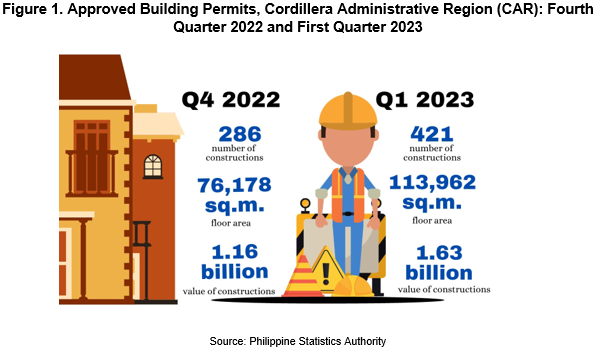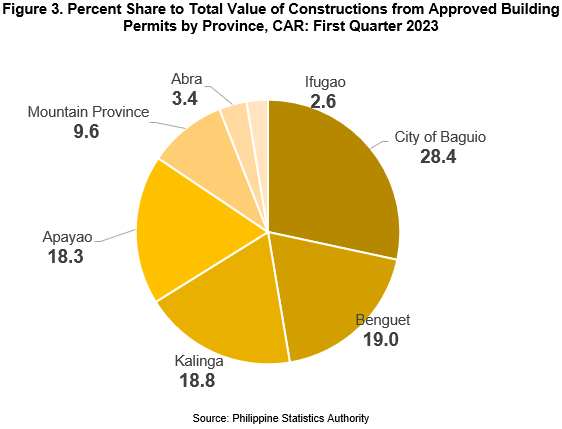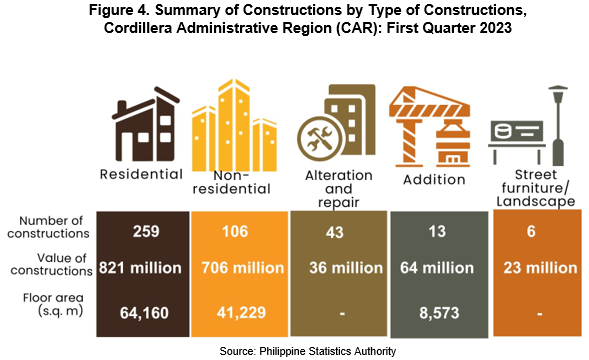Number of constructions decrease by 15%
The region recorded a total of 421 construction activities in the first quarter of 2023 with a total floor area of 113,962 square meters and total value of constructions of PhP 1,628 billion based on the results of first quarter 2023 approved building permits.
The number of approved building permits in the region increased by 47.2 percent from 286 approved construction activities in the fourth quarter of 2022.

Baguio City construction activities increases in 2023
The City of Baguio recorded the most number of constructions in the first quarter of 2023with a total of 107 construction activities that comprised 25.4 percent of the total construction activities in the region.
Kalinga approved 95 construction permits comprising 22.6 percent of the total construction activities and Apayao with 75 constructions sharing 17.8 percent to the total construction activities in the first quarter of 2023.
The remaining provinces in the region contributed 34.2 percent share to the total construction activities of the region in the first quarter of 2023.

City of Baguio records highest value of constructions
The value of approved constructions in City of Baguio was PhP 462 million or 28.4 percent of the total value of constructions in the first quarter of 2023 in CAR.
Benguet followed with total value of constructions of PhP 308 million or 19.0 percent share of the total value of constructions in the region. Apayao came next with value of PhP 297 million or equivalent to 18.3 percent share to the total value of constructions in Cordillera during the first quarter of 2023.

Residential buildings account the highest number
Among the type of constructions, residential building constructions remained the highest number of construction activites with 259 constructions recorded in first quarter of 2023. This was equivalent to an increase of 34.2 percent from the 193 constructions in the fourth quarter of 2022.
This was followed by non-residential construction with 106 building constructions recorded. A total of 43 alterations and repairs were recorded in the first quarter of 2023.
Activities on additions and street/furniture/landscape were also recorded with 13 and 6 construction activities, respectively.

The total value of construction projects for residential buildings increased by 40.4 percent from PhP 585 million in the fourth quarter of 2022 to Php 821 million in the first quarter of 2023. Meanwhile, the total floor area of the residential construction projects increased by 43.1 percent from 44,814 square meters in the fourth quarter of 2022 to 64,160 square meters in the first quarter of 2023.
Residential buildings comprise half of total value of constructions
In terms of the value of constructions, residential buildings had the highest value of constructions with PhP 821 million or 50.5 percent of the total value of constructions of the region in the first quarter of 2023.
Non-residential constructions were valued at PhP 706 million or 43.4 percent of the total value of constructions in the first quarter of 2023.
(SGD)
VILLAFE P. ALIBUYOG
Regional Director
_____________________
TECHNICAL NOTES
Building permit is a written authorization granted by the LBO to an applicant allowing him to proceed with the construction of a specific project after plans, specifications, and other pertinent documents have been found to be in conformity with the National Building Code (PD 1096).
Building refers to any independent, free-standing structure comprised of one or more rooms or other spaces, covered by a roof and enclosed with external walls or dividing walls, which extend from the foundation to the roof.
Construction refers to all on-site work done from site preparation, excavation, foundation, assembly of all the components and installation of utilities, machineries, and equipment of buildings/structures.
Residential building is a building for which its major parts or more than half of its gross floor area is built for dwelling purposes. This type of building can be of the single type, duplex, apartment and/or accessoria, and residential condominium.
Non-residential building includes commercial, industrial, agricultural, and institutional buildings.
Commercial buildings refer to office buildings and all buildings which are intended for use primarily in wholesale, retail, and service trades; i.e., stores, hotels, restaurants, banks, disco houses, etc.
Industrial buildings are buildings used to house the production, assembly, and warehousing activities of industrial establishments; i.e., factories, plants, mills, repair shops, machine shops, printing press, storage plants, electric generating plants.
Institutional buildings are buildings which primarily engaged in providing educational instructions and hospital/health care; ports, airports and other government buildings; i.e., schools, museums, libraries, sanitaria, churches, hospitals.
Agricultural buildings are buildings used to house livestock, plants, and agricultural products such as barns, poultry houses, piggeries, stables, greenhouses, and grain mills.
Other non-building constructions include cemetery structures, street furniture, waiting sheds, communication towers, etc.
Addition refers to any new construction which increases the height or area of an existing building/structure.
Repair is a remedial work done on any damaged or deteriorated portion/s of a building/structure to restore its original condition.
Renovation is any physical change made on structures to increase their value and quality.
Alteration is a construction in a building/structure involving changes in the materials used, partitioning and location/size of openings, structural parts, existing utilities, and equipment but does not increase the overall area thereof.
Demolitions refer to the systematic dismantling or destruction of a building/structure, in whole or in part.
Street furniture are street structures consisting of monuments, waiting sheds, benches, plant boxes, lampposts, electric poles, and telephone poles.
Floor area of building refers to the sum of the area of each floor of the building measured to the outer surface of the outer walls including the area of lobbies, cellars, elevator shafts, and all communal spaces in multi-dwellings. Areas of balconies are excluded.
Total value of construction refers to the sum of the cost of building, electrical, mechanical, plumbing, and others. The value is derived from the approved building permit and represents the estimated value of the building or structure when completed.

